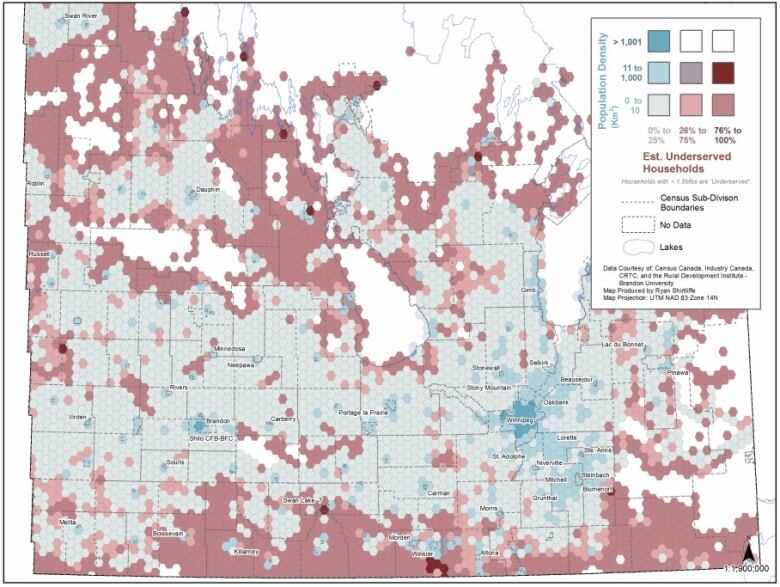Internet service, speeds lacking in pockets of Manitoba, study finds
People along U.S. border, Lake Manitoba Narrows, Riding Mountain underserved, Brandon University study says

Just a day after theCRTClabelledinterneta basic telecommunications service, anew studysays southern Manitoba hasmanysmall pockets where internet access is lacking.
And it could affect more than just connectingto Facebook or Netflix, the study says.
The Rural Development Institute at Brandon University released the findings of the study, which was conducted before the Canadian Radio-television and Telecommunications Commission's announcement on Wednesday.
- CRTC declares broadband internet access a basic service
- No connectivity: the internet 'blackout zone' that is rural Canada
"The access in rural Manitoba is not enough," said Wayne Kelly, RDI research associate. "Typically it was ranging in the five to seven megabits per second [range], with small centres having higher access."
In declaringbroadband internet a basic telecommunications service, theCRTC also calledfor a target download speed of 50 megabits per second in Canada by 2021.
Kelly said the RDI's research found internet access was lacking along the Canada-U.S border, a sparsely populated area with few towns,and where more than 75 per centofhouseholds don't have access to internet speeds faster than 1.5 megabits per second.

Communities like Killarney andPilot Mound, and the area around Turtle Mountain Provincial Park all about an hour's drive away from Brandon were also found to be lacking in access speeds, along with towns near Riding Mountain National Park and the Lake Manitoba Narrows.
Geography and a lack of competition in some regions were cited as reasons for the lack of service.
Pockets across Manitoba
However, small pockets of insufficient access exist right across southern Manitoba, according to Kelly.
- Federal government spending $500M to expand high-speed Internet to remote communities
- First Nations push for full-service internet in Ontario's remote north
"Rural Manitoba is a lot like the rest of Canada," he said. "The majority have good access but there's pockets that don't.
"There's lots of holes in rural Manitoba," Kelly said, addingpeople on farms and in valleys might be too far away from the nearest community or broadband tower to receive access.
"People just outside of Winnipeg are still on dial-up [internet]," Kelly said.
Problem for farmers
And in 2016, slow or non-existent internet could do more than just bring a Netflixstream to a crawl. It could have an effect on the livelihood of residents in those areas.
"We're increasingly hearing of farmers that are using apps and real-time access to decide what to harvest ... If they have cell service and internet service issues, they no longer have the same sort of access that some of their neighbours or competitors [have]," he said.
Kelly said it might also hamper education. Post-secondary courses offered online are increasingly turning to streaming video lectures. Students who don't have the internet speeds to watch those lectures won't be able to take those courses, he said.
'Very few' First Nations have reliable access
ManitobaKeewatinowi Okimakanak Chief Sheila North Wilson welcomed the CRTC'sWednesday announcement, and said many rural First Nations face some of the same access issues.
"Very few of the MKO First Nations have the internet services mandated through the CRTC's Basic Service Standard," North Wilson said in a release, adding that MKO participated in the CRTC consultations.
"MKO told the CRTC that, even with the significant limitations in existing services, the internet is already essential to the MKO First Nations through the growing use of social media to communicate with both friends and family and to share information," North Wilson said.
She said the CRTC's ruling will help promote northern technology infrastructureand will help with gaps in health and education services.
Infrastructure gettingattention
Kelly said companiesare making improvements to infrastructure, and rural internet has received a lot of attention from providersin the past year. But one-time improvements like new towers won't be enough to meet the need down the road, he said.
"It's not somethingyou can do once," Kelly said. "You're going to have to continually improve and enhance this infrastructure."
Kelly said another study in the new year will at look at how people use the internet indifferent regions, and will hopefully help determine the next steps for infrastructure needs and opportunities in southern Manitoba.












_(720p).jpg)


 OFFICIAL HD MUSIC VIDEO.jpg)
.jpg)



























































































